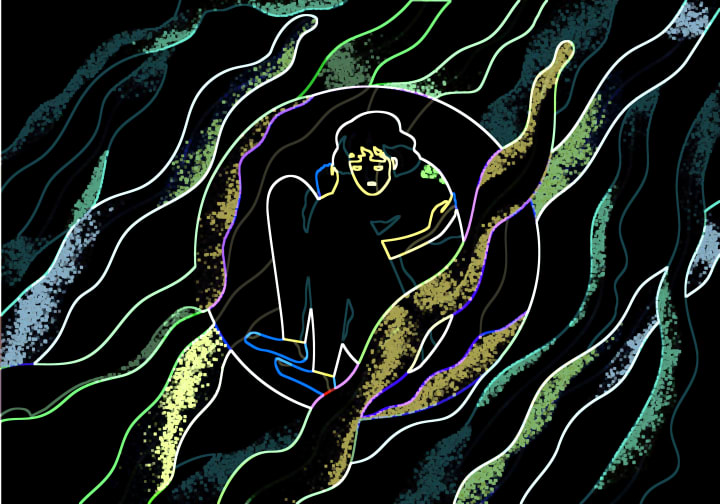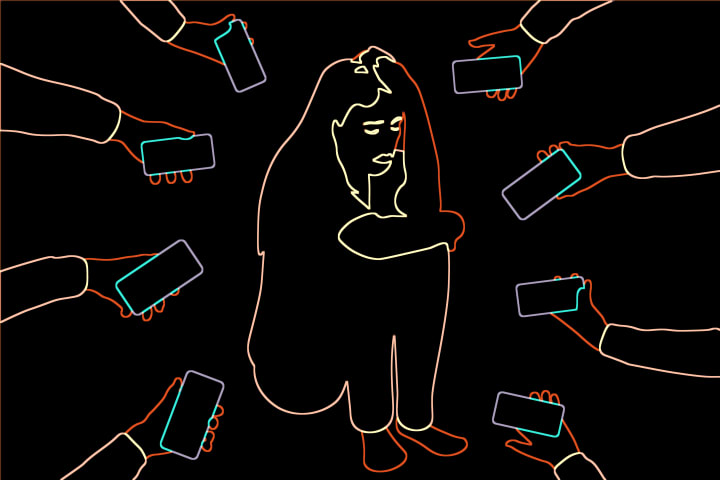Will Young People Forever be Shackled to Social Media?
Apps like Twitter and Instagram are corrosive to our mental health. Knowing that doesn’t make them any easier to quit.

At age 24, I can hardly imagine my life without social media.
I wake up. I check my notifications. Sometimes this ritual can make me happy, like when a friend reaches out to say something kind or laugh at a joke I shared. But most of the time, checking my phone in the morning is like dumping scalding hot water on my head.
It only takes a swipe or two to find an outrageous video clip, a depressing news article, or an infuriating reminder that the planet is dying to bring me crashing down.
Today’s depressing, infuriating, and outrageous clip comes from an anti-vax protest in New York:
Can I go back to bed now?
But seriously, a little about me. I’m 24 years old, which puts me on the horizon line between millennial and zoomer. I have crushing student loan debt and a broken attention span!
I moved away from home about two years ago, so I maintain most of my longstanding friendships through social media. And as a writer sharing my point of view with an audience, promoting what I write through my social media channels isn’t optional anymore. No question, even well-established writers will fail to get their work seen if they do not capitalize on their social media apparatus.
And while young people still dedicate more time to social media than older folks, we have long been aware of these apps’ adverse effects on our health, while our gerontocracy is still catching up. Increased depression and body dysmorphia, paired with drops in self-esteem and attention span, can all be traced back to social media use at a young age.
Yet, for so many young people, the thought of permanently disconnecting from our usual digital communication channels is terrifying, like standing on the edge of a 100-foot high diving board. We know we cannot stand on this edge forever, the crowd of hard truths behind us is getting impatient, but the waters that await us below are murky.
As social media companies like Facebook… err, I mean Meta, continue to earn horrendous press for their destructive impact at home and across the world, could these revelations push young people to make the post-social plunge?

Talking to friends (via Instagram DMs, of course) about their relationship with social media, we were all aware of these platforms’ denigrating effects on our mental health and well-being.
What to do about it was a more open-ended discussion.
The biggest fear concerning quitting social media was the worry that we would be incredibly lonely without it. If we disappeared from Instagram, we would be untagged, left off invitation lists, and, intentionally or not, slowly forgotten. Instead of being ghosted, we would become the ghost.
This isolation extends further than a lack of connection with friends, but with society at large. Even with friends offline, we always share memes and jokes that build upon each other as they gain popularity online. Not on Twitter? You’re not in on the joke either.
For me, leaving social media is abandoning communities of shared interest that accepted me when I felt unaccepted and ostracized from the small suburban town I grew up in. There was a time where talking with online friends about hip hop, basketball, and politics was the panacea to my loneliness.
Now, researchers are telling us that social media, initially intended to bring us closer, is, in fact, making Gen Z far lonelier than previous generations.
From CNBC:
One reason why younger people may feel more isolated, may be their greater tendency to use social media. The study found an increasing correlation between social media usage and feelings of loneliness. Seven out of 10 heavy social media users, 71%, reported feelings of loneliness, up from 53% a year ago. That compares to 51% of light social media users feeling lonely, up from 47% a year ago.
So, while we cite fear of loneliness as an excuse to stay on Twitter, Instagram, or Facebook, the intense level of connection these apps provide fuels unrealistic and unhealthy expectations of ourselves and others. Will knowing this motivate young people to make a change?

Maybe it’s not so cut and dry.
Sure, researchers link extended social media use to depression, lack of focus, and an increased feeling of isolation. Still, if we moderate how much time we spend online, we can find that sweet spot between connected and over-connected and be okay, right?
Unfortunately, Twitter, Facebook, and Google designed these apps to keep us engaged for as long as possible. As you’ve probably experienced, they do a fantastic job of this, using “behavioral design” to turn social media usage from casual participation in an online community into a full-blown addiction.
From Business Insider:
“Facebook is a good example of a supplement that can quickly transform into a painkiller when you begin to get to the stage where you can’t manage without it any longer,” he said. There’s no point in demonizing apps, however — monetisation and ethical app development are not mutually exclusive.
“The reason some apps are addictive is that most companies first ask themselves how they can make money with them — but ethical app development focuses on the user,” argued Mezyk.
Does it have to be this way?
Perhaps one day in the future, a social media company with a genuine interest in its user’s well-being will debut. Some morally-conscious angel investors concerned more with user safety than exponential monetization and profits could appear to whisk us away from our Silicon Valley echo chambers. But, alas, this is not the innovation Western capitalism breeds.
For now, despite all the damming evidence waiting behind me, I will be staying on this diving board, looking down at those murky waters and wondering what could be. While I stand here, I’ll be devoting less time to my social media presence and more time to making connections in the physical world, hoping the waters get clearer and I get up the courage to leap.
Nick Lozier.
About the Creator
Nick Lozier
I'm Nick, a writer and photographer living in Seattle's Capitol Hill Neighborhood. My writing explores youth culture and Gen Z’s relationship with capitalism, democracy, and the generations before us.







Comments (1)
Great points. I believe there’s hope for social media to be used more to educate, spread positivity and bring people together. There wil always be negativity out there just like there always will be negativity in the real world, but it’s possible to reduce the negativity with more pieces like this to be written and shared ❤️